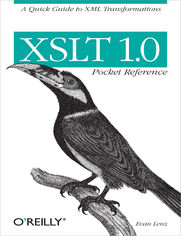XSLT 1.0 Pocket Reference - Helion

ISBN: 978-14-493-6604-9
stron: 178, Format: ebook
Data wydania: 2005-08-12
Ksi─Ögarnia: Helion
Cena ksi─ů┼╝ki: 29,67 z┼é (poprzednio: 34,50 z┼é)
Oszczędzasz: 14% (-4,83 zł)
XSLT is an essential tool for converting XML into other kinds of documents: HTML, PDF file, and many others. It's a critical technology for XML-based platforms such as Microsoft .NET, Sun Microsystems' Sun One, as well as for most web browsers and authoring tools. As useful as XSLT is, however, most people have a difficult time getting used to its peculiar characteristics. The ability to use advanced techniques depends on a clear and exact understanding of how XSLT templates work and interact.
The XSLT 1.0 Pocket Reference from O'Reilly wants to make sure you achieve that level of understanding. With its concise approach, this handy pocket guide quickly gets you up to speed on XSLT 1.0 so you can covert XML like a seasoned pro. In addition to covering the basics of stylesheet structure, it also explains how to:
- use template rules
- create a result tree
- apply conditional processing
- transform multiple source documents
- employ number formatting
Thanks to their convenient, quick-reference format, O'Reilly's Pocket References spare you from having to hunt through larger books for answers. They deliver just what you need to get the job done in a timely fashion. And the XSLT 1.0 Pocket Reference is no different--it's the ideal companion to have at your desk when you need an answer fast.
Osoby które kupowały "XSLT 1.0 Pocket Reference", wybierały także:
- XSLT. 2nd Edition 157,37 zł, (29,90 zł -81%)
- Java and XML. 3rd Edition 157,37 zł, (29,90 zł -81%)
- Perl and XML 124,58 zł, (29,90 zł -76%)
- Programming Jabber. Extending XML Messaging 124,58 zł, (29,90 zł -76%)
- Python & XML. XML Processing with Python 124,58 zł, (29,90 zł -76%)
Spis tre┼Ťci
XSLT 1.0 Pocket Reference. A Quick Guide to XML Transformations eBook -- spis tre┼Ťci
- XSLT 1.0 Pocket Reference
- 1. Data Model
- Node Types
- Node Properties
- 2. The XPath Language
- Data Types
- Result Tree Fragments
- Expression Context
- Kinds of Expressions
- Node-Set Expressions
- Location Paths
- Steps
- Axes
- Node tests
- Abbreviations
- How Location Paths Are Evaluated
- Predicates
- Context size in predicates
- Context position in predicates
- Numeric predicates
- Step filters versus expression filters
- Other Node-Set Expressions
- Location Paths
- Number Expressions
- Arithmetic Operators
- String Expressions
- Boolean Expressions
- Comparisons Involving Node-Sets
- Comparing Simple Values
- Data Types
- 3. How XSLT Works
- Stylesheet Structure
- Processing Model
- Template Rules
- Applying Template Rules
- Patterns
- Conflict Resolution for Template Rules
- Priority
- Modes
- Built-In Template Rules
- Template Rule Content
- Literal Result Elements
- Attribute Value Templates
- How XPath Context Is Initialized
- Whitespace Stripping
- Serializing the Result Tree
- Disabling Output Escaping
- XSLT Elements by Use Case
- 4. Elements
- Top-Level Elements
- Instructions
- Special Elements
- QNames
- Element Reference
- <xsl:apply-imports>
- <xsl:apply-templates>
- <xsl:attribute>
- <xsl:attribute-set>
- <xsl:call-template>
- <xsl:choose>
- <xsl:comment>
- <xsl:copy>
- <xsl:copy-of>
- <xsl:decimal-format>
- <xsl:element>
- <xsl:fallback>
- <xsl:for-each>
- <xsl:if>
- <xsl:import>
- <xsl:include>
- <xsl:key>
- <xsl:message>
- <xsl:namespace-alias>
- <xsl:number>
- <xsl:otherwise>
- <xsl:output>
- <xsl:param>
- <xsl:preserve-space>
- <xsl:processing-instruction>
- <xsl:sort>
- <xsl:strip-space>
- <xsl:stylesheet>
- <xsl:template>
- <xsl:text>
- <xsl:transform>
- <xsl:value-of>
- <xsl:variable>
- <xsl:when>
- <xsl:with-param>
- 5. Functions
- XPath Functions
- XSLT Functions
- Data Type Conversions
- Strings
- Numbers
- Booleans
- Node-Sets
- Function Reference
- 6. Extending XSLT
- Extension Functions
- How to Use an Extension Function
- Extension Elements
- How to Use an Extension Element
- EXSLT
- EXSLTCommon
- Core FunctionsCommon Module
- Optional ElementsCommon Module
- <exsl:document>
- EXSLTDates and Times
- Data Types
- Core FunctionsDates and Times Module
- Optional FunctionsDates and Times Module
- Optional ElementsDates and Times Module
- EXSLTFunctions
- Core ElementsFunctions Module
- <func:function>
- <func:result>
- Optional ElementsFunctions Module
- <func:script>
- Core ElementsFunctions Module
- EXSLTMath
- Core FunctionsMath Module
- Optional FunctionsMath Module
- EXSLTRandom
- Core FunctionsRandom Module
- EXSLTSets
- Core FunctionsSets Module
- EXSLTDynamic
- Optional FunctionsDynamic Module
- EXSLTRegular Expressions
- Optional FunctionsRegular Expressions Module
- EXSLTStrings
- Optional FunctionsStrings Module
- Extension Functions
- A. XPath 1.0 Grammar
- Productions from XPath 1.0
- Productions from Namespaces in XML
- Productions from XML 1.0
- B. XSLT Pattern Grammar
- Index
- About the Author
- Copyright





